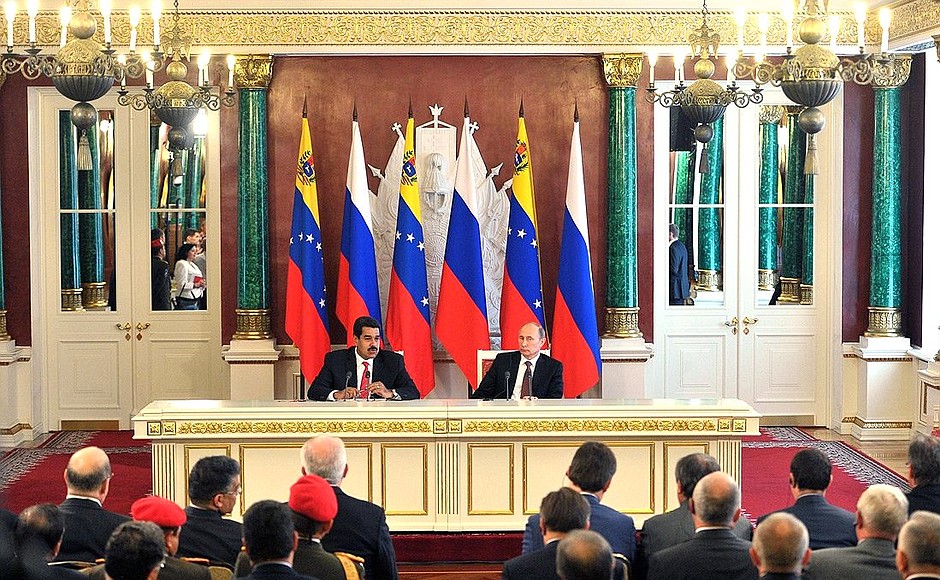
President of Russia Vladimir Putin: Mr President, Ladies and gentlemen,
We have just had substantial and constructive talks with President of Venezuela Nicolas Maduro, and have discussed the key areas of our bilateral strategic cooperation. It was President Hugo Chavez, a strong and courageous man and a true great friend of Russia, who was at the origins of this close cooperation. Here in Russia, we have not forgotten him and we honour his memory. One of Moscow’s streets has been named in his honour as part of a public event under the name Russia Honours Hugo Chavez’ Memory.
Mr Maduro and I discussed our common desire to continue the strategic cooperation between our two countries in all areas.
We both took part in the second Gas Exporting Countries Forum summit and we think it was a success. We agreed to continue coordination of our work through the GECF to develop the global gas market and promote gas producer countries’ interests.
“Venezuela is a key partner for Russia in Latin America. Our bilateral trade increased by more than 12 percent in 2012 and came to more than $2 billion. It posted a three-fold increase over the first quarter of 2013.”
Venezuela is a key partner for Russia in Latin America. Our bilateral trade increased by more than 12 percent in 2012 and came to more than $2 billion. It posted a three-fold increase over the first quarter of 2013. True, this was also the result of several big military-technical cooperation and industrial equipment supply deals, but the general trend is clear.
Russian investment in the Venezuelan economy is increasing and now comes to an aggregate of $21 billion. We are also seeing Venezuelan investment in Russia, currently at a figure of $1.1 billion.
The energy sector is an important area for our joint investment projects. In September 2012, the Russian National Oil Consortium launched the first oil well at the Junin-6 oil field (investment totalling up to $20 billion).
INTER RAO UES is supplying gas turbine installations for power stations under construction in Venezuela, and is helping to build a thermal power station at Puerto la Cruz.
We see big potential in industrial cooperation. Russia and Venezuela are carrying out promising projects in the automotive industry, machine building, transport, and infrastructure.
KamAZ plans to establish a joint venture with Venezuela to produce trucks and buses. Five service centres have already been built for servicing these vehicles. The company is taking part in modernising Venezuela’s public transport fleet.
“The energy sector is an important area for our joint investment projects. In September 2012, the Russian National Oil Consortium launched the first oil well at the Junin-6 oil field (investment totalling up to $20 billion).”
Sovcomflot shipping company is transporting Venezuelan oil and oil products. Transport of these products from Venezuela’s ports has increased 7-fold over the last two years and now comes to 15 million tons a year.
The Moscow City Government Housing Construction Support and Development Fund is helping to build social housing in Venezuela. The programme’s first stage will see more than 6,000 apartments ready to move into by the start of 2014.
Our humanitarian ties are also developing. In August 2012, the Days of Russian Culture were organised in Venezuela, and a Russian Science and Culture Centre has been open and operating in Caracas since September 2012. An intergovernmental agreement on establishment and functioning conditions of science and culture centres took effect on April 30 this year. Every year, 50 Venezuelan students study at Russian universities at Russian federal budget expense.
We gave considerable attention to international issues during our talks. I want to thank our Venezuelan colleagues for the friendly spirit and substantial discussion today.
I take this opportunity to congratulate you, Mr President, and all of friendly Venezuela’s people on your upcoming national holiday, Independence Day, on July 5.
Thank you very much for your attention.